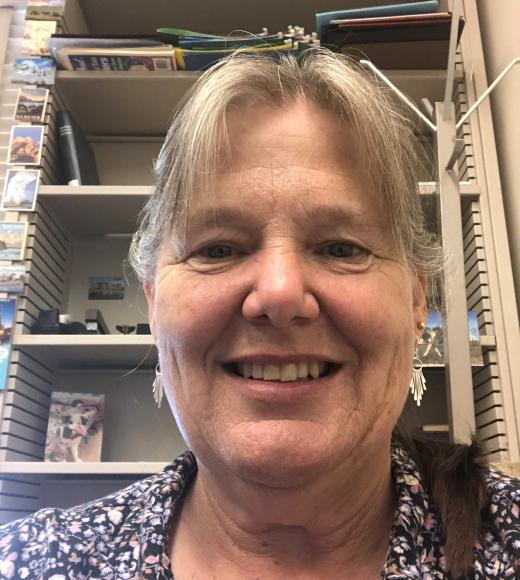
Position Title
Professor of German
Director of the UC Davis Language Center (DLC)
Education and Degree(s):
- Ph.D., University of Michigan, 1995
- M.A., University of California, Berkeley, 1991
- B.A., Mount Holyoke College, South Hadley, MA, 1987
Research Interest(s):
- Germanic Linguistics
- Cognitive Grammar
Course(s) Taught:
- German 48. Germanic Myth and Mythology
- German 101A. German Literature from 800-1750
- German 105: Modern German Language
- German 291 Foreign Language Learning in the Classroom
- HUM2A: International Crime Fiction
Profile:
The main focus of my research is to test the efficacy of using Cognitive Grammar to provide explanations of German and Russian grammar to first and second year language students. To date, the use of schematic diagrams combined with student centered learning has been shown to be effective in our program for Russian case at the first year level, German case and two-way prepositions at the first year level and German case at the second year level. The theoretical foundation provided by CG can be combined with Sociocultural Theory to effectively teach grammar in the target language by having the students actively manipulate the grammatical structures they are trying to learn in the Zone of Proximal Development. It has been an exciting endeavor to integrate this way of teaching grammar into our undergraduate curriculum.
When not wearing my applied linguist's hat, I focus on syntactic structures in Modern German and Old Saxon with occasional forays into the other historical Germanic languages. I have a strong interest in oblique subject constructions in all of their forms and usages. I recently worked on the Indo-European Non-Canonical Case Project, which collected all the extant examples of this construction from all the modern and historical Germanic languages. Occasionally, I delve into medieval texts to pursue my interest in agriculture and animal husbandry in the middle ages.
Selected Publications:
2021. “Problematic Phonemes” and German /ɛ:/ An acoustic analysis” with Kristin Predeck and Aleese Block. Proceedings of the Linguistic Society of America, Volume 6:1, 280-287.
2021. Thralls in Old Icelandic Literature: Historical Trope or Literary Device? In Incarceration and Slavery in the Middle Ages and the Early Modern Age, ed. by Albrecht Classen. Lexington Books. Lanham, MD.
2019. ‘Hestaþing (Horse Meeting/s) in Medieval Icelandic Culture’. In Pleasure and Leisure in the Middle Ages and Early Modern Age: Cultural=Historical Perspectives on Toys, Games and Entertainment, ed. by Albrecht Classen. Berlin: De Gruyter,
2019. with Ferran Suner and Daniel Pust. ‘Using Cooperation Scripts and Animations to Teach Grammar in the Foreign Language Classroom’. 2019. In German Cognitive Linguistics Association Yearbook, ed. by Michael Pleyer and Monika Pleyer. Berlin: De Gruyter.
2019. with Dirk Hansen and Ferran Suñer, Leveraging collaborative work for game-based language learning. In F. Meunier, J. Van de Vyver, L. Bradley & S. Thouësny (Eds), CALL and complexity – short papers from EUROCALL 2019 (pp. 1-5)
2019 with Ferran Suner. Leveraging Cognitive Linguistic Approaches to Grammar Teaching with Multimedia Animations. Journal of Cognitive Science 20-3:365-399.
2015. with Kyoko Masuda and Angela Labarca (eds.). Cognitive Linguistics and Sociocultural Theory: Applications for Second and Foreign Language Teaching. Studies in Second and Foreign Language Education Series. Berlin: Mouton de Gruyter.
2015. with Karina Deifel. “Two-way Prepositions and L2 Students of German”. Cognitive Linguistics and Sociocultural Theory: Applications for Second and Foreign Language Teaching. ed. by Kyoko Masuda, Carlee Arnett and Angela Labarca. Studies in Second and Foreign Language Education Series. Berlin: Mouton de Gruyter.
2015. with Tonya Kim Dewey. “The Anticausitive Caused Motion Construction in Old Saxon: A Source of Oblique Subjects”. Zeitschrift für deutsche Sprache und Literatur [PBB]. 137.2, 183-220.
Teaching Experience:
- Assistant Professor (visiting), Ohio State University, 1997-1998
- Assistant Professor, University of Arizona, 1998-2000
- Faculty member, Interdisciplinary Program in Second Language Acquisition and Teaching
- Director of Basic Languages, Department of German
